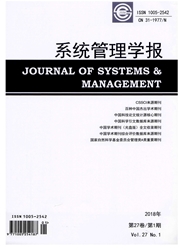

 中文摘要:
中文摘要:
大量研究表明,人具有公平偏好,而公平偏好影响人的行为。将公平偏好理论应用到供应链质量管理中,以F—S模型为基础,建立了供应商与制造商的收益模型,研究非对称信息条件下具有公平偏好风险中性制造商的收益分享和供应商质量投入的关系。研究结果表明:供应商的最优质量投入与公平偏好无关;制造商提供的固定补贴不受自身公平偏好的影响,但受供应商公平偏好的影响;制造商的期望效用也受到供应商和制造商自身的公平偏好影响。
 英文摘要:
英文摘要:
Many studies indicate that people are of fairness preference, behavior. We apply the fairness theory in supply chain quality management in based on F S model, where both manufacturers and suppliers are assumed to and fairness preferences under asymmetric information. The results indicat quality input does not affected by fairness preference. However, the act expected urers is affected by the fairness preference of the suppliers b utility of manufacturers is affected by the fairness of both the which influence this paper. We b be of risk-neutral e that the suppli fixed allowance s people ' s uild a model preferences ers' optimal ut not that of manufact suppliers and offered by urers. The facturers.
 同期刊论文项目
同期刊论文项目
 同项目期刊论文
同项目期刊论文
 Incorporating Overconfidence into Real Option Decision-Making Model of Metal Mineral Resources Minin
Incorporating Overconfidence into Real Option Decision-Making Model of Metal Mineral Resources Minin 期刊信息
期刊信息
